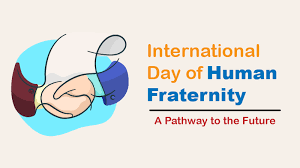International Day of Human Fraternity: History & Significance

International Day of Human Fraternity: On December 21, 2020, the UN General Assembly declared the International Day of Human Fraternity. Every year on February 4, the International Day of Human Fraternity is celebrated. This day, which falls in the middle of the International Interfaith Harmony Week is recognised by one of the world’s leading transnational organisations– the United Nations. It underscores the importance of humanity coming together as a united community in times that are increasingly characterised by ethno-nationalistic, political, and economic polarisation.
February 2023 Current Affairs Quiz
International Day of Human Fraternity: History:
The historic “Human Fraternity for World Peace and Living Together” document signed on February 4, 2019, by the Grand Imam of Al-Azhar, Ahmad Al-Tayyeb, and Pope Francis is the reason behind the creation of the International Day of Human Fraternity. The document promotes the values of love, mutual respect, and cooperation between people of different religions and cultures and aims to create a world where everyone can live in peace and dignity. The day is significant as it highlights the importance of promoting interreligious and intercultural dialogue and cooperation as a way to build a more peaceful and harmonious world.
International Day of Human Fraternity: Significance
In 2023, the day will be marked in the backdrop of multiple conflicts whether on grounds of political ideology, territorial disputes, religious differences, or economic inequities. They mark a sorry human condition, marked by many divides and a lack of peace and harmony.
The importance of compassion, religious tolerance, and mutual respect is recognised on International Day of Human Fraternity. These values promote peace and bring the human community together. However, these values are being threatened by division, inequality, and hopelessness. Hate speech, religious division, and conflict are increasing, and all societies and religions are affected by religious extremism and intolerance.